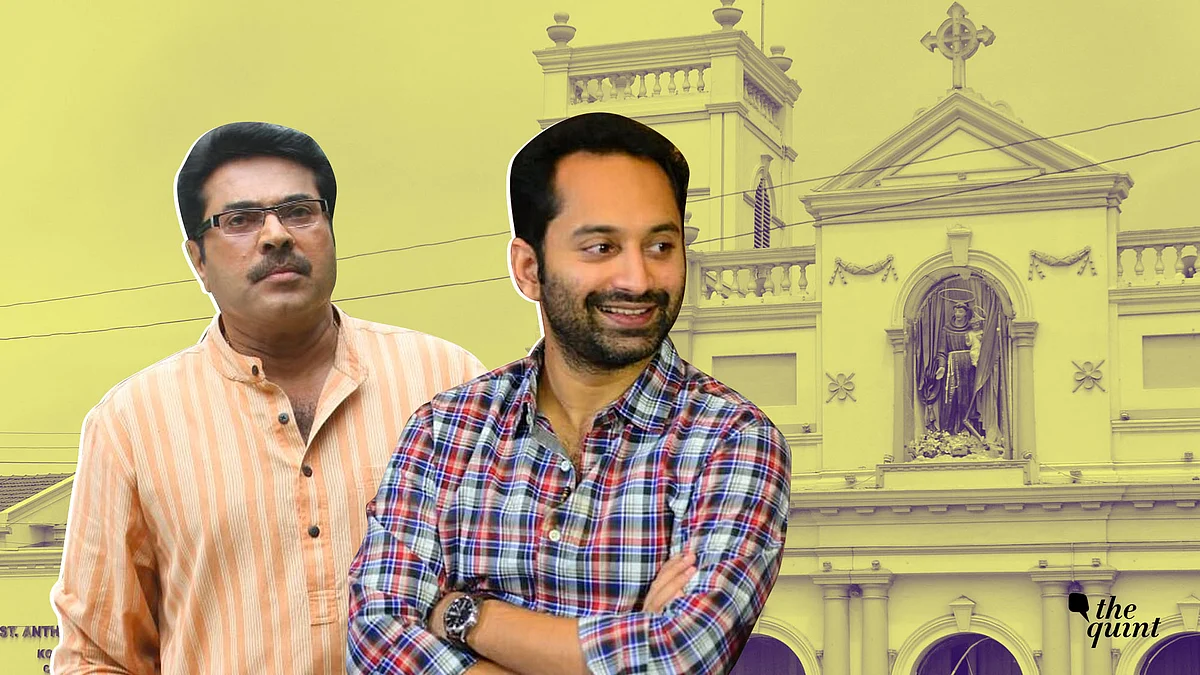
Kerala Won’t Buy BJP’s ‘Divide & Rule’ Plan With Fahadh, Mammootty
It’s time to introspect because Kerala was never a place where artists are gagged or singled out for their religion.

advertisement
What do Malayalam actors Fahadh Faasil and Mammootty have in common (apart from good looks and acting prowess)? Well, in a recent bizarre incident, both of them were asked to take a stand on Islamic terror, out of the blue, by one of BJP’s candidates in Kerala.
Alappuzha’s BJP candidate KS Radhakrishnan, while condemning the terror attack on the church in Sri Lanka, asked actors Fahadh Fasil and Mammootty to respond to it.
Tired of reading? Listen to the story here:
‘Malayali, Not Muslim’
Many Keralites were left wondering what Fahadh Faasil and Mammootty had to do with ‘Islamic’ terror? Why were these two actors singled out? And a lot of them took to social media questioning the rationale behind the statement. Concerns were also expressed: “We have only seen them as Malayali actors, not Muslim actors”, said a tweet.
See, unlike in Bollywood, where the Khans are constantly scrutinised for every word they say and every stand they take, the Kerala film industry has always been immune to religious profiling.
When radical Hindutva unleashed destruction all over the country – with lynchings, hate speeches and anti-Muslim bigotry – Keralites took pride in the resistance the state has always put up against jingoism.
Blatant Attacks on The Rise
Kerala has, of course, had a history of political violence like the decades-long CPIM-RSS standoff in the northern district of Kannur that has killed many. Caste inequality is also a major issue, but communal tension had never figured in the list.
Even BJP leaders in the state lay low... the ‘send Muslims to Pakistan’ and ‘don’t eat beef’ rhetoric would never work in Kerala. But blatant attacks on artists and religions are getting more frequent. In July last year, for instance, writer Hareesh’s novel ‘Meesha’ stirred controversy when Hindutva activists claimed that it showed Hindu women in a bad light.
Desperation Leads to Polarisation
When Yogi said hospitals in Kerala should learn from hospitals in UP or when Modi compared the state to Somalia, they were ridiculed.
When bhakts in the North said consumption of beef caused the floods in Kerala last year, Malayalis asked them to take a hike, while probably enjoying a bowl of beef fry. The BJP is now desperate to open an account in Kerala and that can only mean one thing – polarisation.
So taking a page out of the national leadership, BJP in Kerala is doing everything in its power to other the minorities and homogenise the Hindus, a phenomenon that did not exist in Kerala until a few years ago.
BJP and RSS are working day and night to instill fear in Hindus, the fear that their religion is in danger in a state like Kerala where leaders are pandering to Christian and Muslim communities.
In a state where religion and politics were always two separate entities, RSS has taken over the working of temples, politicising them, turning them into centres where the message of radical Hindutva is injected.
The Sabarimala issue, considered one of the biggest issues in this elections, gave a foothold for the BJP to move the discourse away from women’s rights to how an atheist government doesn’t give two hoots about Hindus. So now if a Yogi or a Shah call Muslim League ‘green virus’, it will be brushed aside. When a BJP leader says “there is a peace in the state because of RSS’s generosity,” there might be no outrage. It is disconcerting.
This Election Is a Test
That is why this election, more than any election before, is a test of the state’s age old rebellion. Now is the time to realise the politics of hatred and reject it. This is Kerala's last chance, lest it become communal and toxic like its Northern counterparts.
Because Kerala needs to bring back those early morning scenes – a Gandhian and a communist huddling over the daily newspaper in the local tea shop, having heated debates on socialism, capitalism, industries, debt. Where well-read pals from different political parties hash out differences over tasty food.
- Access to all paywalled content on site
- Ad-free experience across The Quint
- Early previews of our Special Projects
Published: undefined